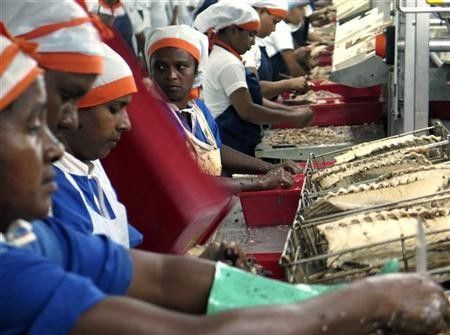Mauritius cuts foreign reserve exposure to euro, dollar

Mauritius is cutting its foreign reserve exposure to the U.S. dollar and the euro due to debt concerns in both regions by purchasing commodity currencies and is eyeing government securities from some of the BRIC nations, it said on Monday.
Bank of Mauritius Governor Rundheersing Bheenick said that although policymakers around the world were hoping the crises will be solved at the G7 level, developing nations could take some steps to shield themselves.
"Since these two (euro and dollar) are reserve currencies, they (their problems) have implications for the rest of us. There are some lessons to be learnt from it. For the immediate future all of us should try to protect our economies from the worst repercussions of these crises," Bheenick told a news conference in the Kenyan capital.
"One of these is to make sure we do not get too exposed to these currencies and take such steps that reserve managers can take in your own country, quietly, to diversify away from too much dependence on what happens to these reserve countries."
The Indian Ocean island nation with an $11 billion economy and a population of 1.3 million has reserves of $2.9 billion, up from $1.4 billion in 2006, the governor said.
Apart from euros, dollars and pounds, the reserves are held in commodity currencies, New Zealand dollar, Australian dollar and the Canadian dollar, the governor said without giving a percentage breakdown.
"We have diversified furiously in the past four years... We are busy looking at the possibility of buying Chinese Reminimbi bonds and also South African and Indian bonds just to diversify away from too much dependence on the well known euro, dollar and GBP (pound sterling)," he said
"Of course we have doubled our gold holdings. We bought two tonnes over three years ago when it was not fashionable to buy gold. Now everybody wants to buy gold."
Mauritius bought gold when it was at $950 an ounce.
Njuguna Ndung'u, the Kenyan central banker told the same news conference that east Africa's biggest economy had not taken a decision on whether to accumulate gold reserves.
With over 40 percent of its imports in dollars, Ndung'u said the country will be staying with the U.S. currency as a key part of reserves, unless something drastic happened.
"The trading partners are always the major decision points or even the commodities you are trading in," Ndung'u said.
"You can see it will be very difficult to move away from the dollar unless something happens."
IMBALANCE
But Bheenick, whose country has the bulk of imports denominated in dollars and the bulk of its exports denominated in euros, said they are also diversifying reserves due to trade reasons.
"There is an imbalance there between the two and we have a large chunk of our imports coming from India and China so we want to move away from dollar based trade to Yuan based trading in China and rupee based trading with the Indians. Likewise with the South Africans with whom we trade a lot," he said.
"We want to have direct trading, trying to bypass the dollar channel and the euro channel."
Bheenick said the country's rate decision next month will depend on inflation, which has started to creep up this year.
"We expect it to rise to 5-6 percent and as of now, we expect to have our growth rate at 4.6 percent this year and last year it had gone down to 3.5 percent," he said.
The annual average inflation rate edged up to 5.5 percent in July from 5.1 percent in the previous month, accelerating for the 13th straight month.
© Copyright Thomson Reuters {{Year}}. All rights reserved.





















